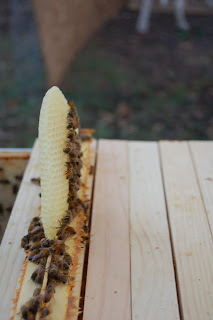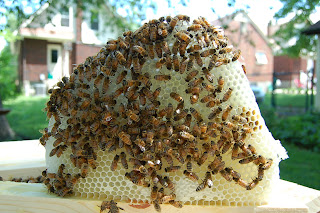So here I am, a couple months later, still a blogging slacker. It's not that nothing has been happening, although the season of bee updates is basically over until spring. Unfortunately fourth quarter in my line of work (my real job, that is) is quite a crazy time. Long days sap most of my energy and rarely do I feel like spending any more time in front of the computer. I'm fairly sure most of my generation will have permanent damage to our eyes from staring at computer monitors for so long.
What has been happening, you ask? Well...
The chicken coop and run are finished.
The chickens are getting bigger and exploring the backyard.
Buttercup is growing into her pouf.
Oh, and I have a rooster, and he is crowing.
And yes, I realize none of those things are bee related. Weather has been pretty crazy and I've seen my bees out and flying during the last weeks of November. It doesn't seem normal, but there isn't much to compare to since this is my first fall/winter of beekeeping. I spent the month of October thinking about how I needed to feed more, but never actually having time to refill the feeder more than once. I also put about 3/4 cup of mini marshmallows in the hive that the bees can eat over the winter.
At this point, I think opening the hive would do much more harm than good, so I just have to keep my fingers crossed that they make it while preparing myself that they may not. I managed to make it through my first season without stings, though Rosie dog was not so lucky. She took it upon her dopey self to jump the chicken wire fence I set up around the coop and was promptly stung on two different occasions. I only felt a little bad about it.
As you can see from the pictures, most of the backyard time for the past few months has been spent on chicken-related pursuits. Last weekend he finally finished the permanent outdoor enclosure. It looks so amazing. It's more awesome than I could have ever imagined. I'm so grateful to my dad for helping me with it. Okay..he did most of the work. The chickens are so very funny and a source of happiness for me every day. I'm having a hard time thinking of how exactly to thank my dad. How do you thank someone for enabling you to have something that gives such pure and true joy? I'm not sure there's a way.
I'm still waiting on my first egg. I know it's coming at any moment, just as I knew my rooster would be crowing soon. Hearing his first crow was so exciting, but reality slowly sunk in as he continued to crow and crow and crow and crow... At the moment it's not a problem since it's cold and everyone has their windows shut. When the spring comes, though, I'm not so sure. So I'm faced with a dilemma. Do I keep him until then or find him a home now? I haven't made up my mind yet. I actually enjoy hearing him crow and find it pleasant. At 5 a.m. on a weekend, though? ... maybe not.
And I know this is a bee/backyard farming blog, but I suppose it's worth mentioning that I met someone who is not only wonderful but also shares my interest in bees. He has seven hives of his own. We can be a couple of bee nerds together without having to hide our true selves. It is rather amazing to meet someone who shares many of the same interests in agriculture and animals as I do. There are areas where his views differ from mine, but it just makes for great conversations. We have much to learn from each other. I hope he'll be around for many seasons to come.
The bees are sleeping. They probably dream about flowers and sunlight and nectar. Sounds like a nice dream to me. And I am here with expectations,questions, and dreams of my own, heading into winter and staring down my 30th birthday. Things have settled into a good place, finally. Winter cold is coming, but the chickens have a heat lamp, the bees are in their cluster, and my heart is warm, warm, warm.
Life is the flower for which love is the honey - Victor Hugo

.JPG)
.JPG)

.JPG)


























